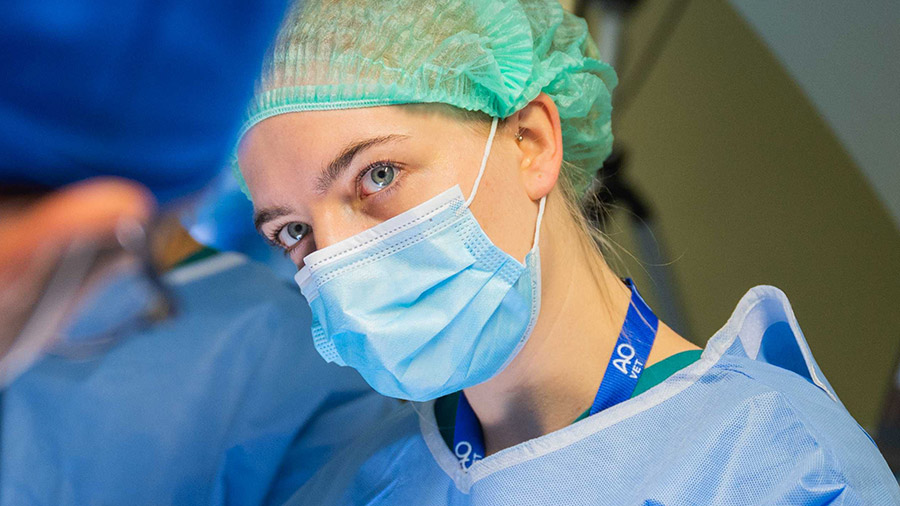AO VET Education Commission (AO VEC) provides faculty update

Curriculum development is again a key focus for the AO VEC in 2023.
Diagnosing and managing lameness in small animals is the subject of a new, interactive, online course that will run over five weeks in 2024. This course was developed with the AO Education Institute (AO EI) and is a competency-based curriculum arising from the needs assessment at the 2018 AO VET faculty retreat in Lisbon, Portugal.
Toy breed musculoskeletal disease and traumatology were also identified in Lisbon as a clear education need at masters course level. In 2023, this course was backward planned with the AO VEC and the AO EI. Lucas Beierer is leading the development of this course, which will incorporate new implants and new bone models.
Ongoing AO VEC goals are to progressively develop validated, competency-based curricula for all the recurring courses so that course chairpersons can provide a needs-based standard curriculum course using prepared learning resources. In 2024, the plan is to update and refine the equine principles course into a competency-based curriculum.
The AO Davos Courses 2022 saw the post-COVID return of face-to-face, on-site masters courses with the running of the highly successful AO VET Course—Clinical Applications of Osteotomy, chaired by Mike Kowaleski and Alessandro Piras.
The AO Davos Courses 2023 (December 3–14) will host both equine and small animal courses (December 10–14). The AO VET Advanced Course—Equine Arthrodesis Techniques and Fracture Fixation, chaired by Anton Fürst, Jose Garcia-Lopez, Fabrice Rossignol, and Felix Theiss, will combine dry and wet labs.
The small animal educational event at the AO Davos Courses 2023 is the AO VET Small Animal Masters Course—Challenging Articular and Juxtaarticular Fractures—Repair and Prosthetic Reconstruction; this course will be chaired by Ken Johnson and supported by Sharon Kerwin and Laurent Guiot. As with the 2022 osteotomy course, the 2023 course will feature state-of-the art bone models developed specifically for this course.
The virtual AO VET Symposium—Bridging the Gap: Translating Clinical Research to Clinical Practice will return to the AO Davos Courses this year, marking the third year of this interactive, hybrid, online symposium showcasing clinical research from AO VET members internationally. AO Davos Courses 2023 faculty and presenters will discuss the clinical relevance and application of the research, with the key aim of translating relevant, applicable, cutting-edge orthopedic research into clinical practice. The symposium is open to both AO VET members and nonmembers. Course participants in Davos will have the opportunity to attend the symposium in person.
The small animal course at the AO Davos Courses 2024 will be chaired by Sharon Kerwin and will be a masters course in feline traumatology and musculoskeletal disease.
Faculty who have been teaching at any of the small animal courses around the world will have noticed progressive replacement of dynamic compression plate (DCP) and limited contact DCP dynamic compression plate (LC-DCP) sets with locking compression plate (LCP) sets. This necessary and overdue change has highlighted the current lack of updated practical laboratory digital learning resources. Development and replacement of these resources is underway but is much more time consuming than the set upgrades, so there will be a period in which the older style non-locking video resources will not match the teaching sets.
Refinement or replacement of the existing bone models is also underway in partnership with Synbone as part of the critical review of the current teaching resources.
Faculty and chairperson rotation policies continue to be applied in all regions internationally with the aims of continuing to engage the best orthopedic educators for teaching while encouraging new faculty with a passion and ability for educating to improve the outcomes of patients with musculoskeletal disorders. As with the human clinical divisions, the cessation of face-to-face, on-site courses during the pandemic in combination with a post-COVID reduction in overall course numbers has slowed this process. The faculty recruitment pathway and process are detailed on the AO VET website.
AO VEC, chaired by Mark Glyde, comprises the education leaders from each of the four world regions—Asia Pacific, Europe, Latin America and North America, led by Chris Tan, Stefan Scharvogel, Eloy Curuci, and Laurent Guiot, respectively. Curuci replaced Javier Corral who was recently elected as Latin America’s representative to the AO VET International Board. Elections for the position of faculty education leader for both Asia Pacific and Europe and South Africa will be held in 2024. Eligible faculty who are interested in contributing to the future of the AO are encouraged to consider applying.
The purpose of the AO VEC is to develop and manage the educational activities of AO VET internationally and particularly to increase engagement and clinical ability in veterinary clinicians and faculty around the world. The AO VEC team and the AO EI welcome faculty input and engagement and encourage any faculty to contact Mark Glyde or any of the team directly.
